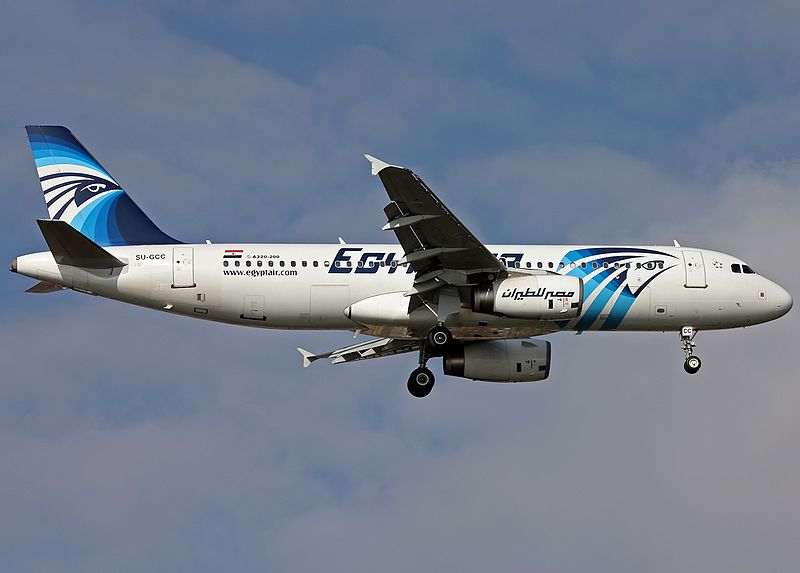How Egyptair affects Political and Economic Perceptions of Egypt
BY CALEB BALDWIN

From skirmishes with insurgents to reports of severe political suppression, Egypt has gained a reputation in recent years for being a hotbed of corruption and controversy. This reputation has been further reinforced by the Egyptian government, led by President Abdel Fattah el-Sisi, which generally refuses to cooperate with the media. However, Egypt’s most recent controversy, the crash of flight Egyptair Flight 804, has resulted in an uncharacteristic dialogue between the Egyptian government and the media. Egyptian Aviation Minister Sherif Fathi is even considering the possibility that the flight may have been sabotaged. This forthright discussion of the crash has been met with surprise and even skepticism, especially from those who remember Egypt’s handling of the crash of Metrojet Flight 9268 less than a year ago. Egyptian authorities had conducted nontransparent investigations which concluded that there was no militant involvement, only to change their minds after subsequent international examinations.
Egyptair Flight 804 disappeared early last Thursday, shortly after entering Egyptian airspace, and before crashing into the Mediterranean Sea. Carrying 66 passengers, it is the second largest plane crash to occur in Egypt in the last year. Egyptian authorities, with the help of Greek naval resources, were able to quickly locate the crashed vessel and begin conducting an investigation. Since then, Egypt has been providing a frank account of the crash and its possible causes, primarily believing it to be the work of terrorists. Unlike the recent Metrojet crash, Egypt has afforded a thoroughness to their inquiries, ruling out no possibilities. Egyptian officials have particularly been exploring the possibility of sabotage, looking for security breaches through which attackers might have been able to bring a bomb on board. Data from the recovered flight recorder revealed numerous stops in North African airports made prior to 804’s final flight, further prompting concerns about a potential breach. No terrorist networks have yet claimed responsibility for the crash.
Rather than focus on the possibility of terrorism, many reporters are instead speculating on the Egyptian government’s unusually candid response to the crash, especially with consideration to the Egyptian economy. The Metrojet crash last October severely impacted Egypt’s most profitable export, tourism, causing a massive decline in visitations and the closing off of many flights to Sharm El Sheikh airport in Egypt. Handling the Egyptair crash considerately and transparently could go towards mitigating the damage that a second crash might inflict on tourism. Others believe that by maintaining transparency, the Egyptian government is establishing grounds to blame the crash on another nation, particularly France, the plane’s point of origin. If they were successful in this endeavor, it could protect Egypt from further damage their dwindling tourist industry might incur from the crash. On the other hand, shifting fault to France would run the risk of weakening diplomatic ties between Egypt and one of the country’s strongest allies.
Egypt’s eagerness to attribute the crash to terrorism is also indicative of a desire to offload as much responsibility for the crash as possible. Egyptian inquirers into the Metrojet crash last October initially dismissed the possibility of foul play, even when Russian, British, and American reports all found that terrorism was the most plausible explanation. Egypt denied the possibility of a terrorist attack with good reason; responsibility for the attack would inevitably be traced back to the Sharm El Sheikh airport from which the flight departed, an airport with particularly lax security measures. Egyptair presents the opportunity for Egypt to both acknowledge the possibility of a terrorist action and remove itself from any significant blame.
With regards to possible motives, it seems that Egypt does not mean to set a precedent with their forthright and transparent treatment of the Egyptair crash. News of the recent arrest of over 150 protestors and the increasing violence in Egypt’s most populated cities has, for the most part, been swept under the rug in President el-Sisi’s bid to maintain power in Egypt. Regardless of the Egyptian government’s consistent issues with media suppression, however, its treatment of the Egyptair crash has not only been important in protecting Egypt’s struggling economy, but also its political perception with its allies.
